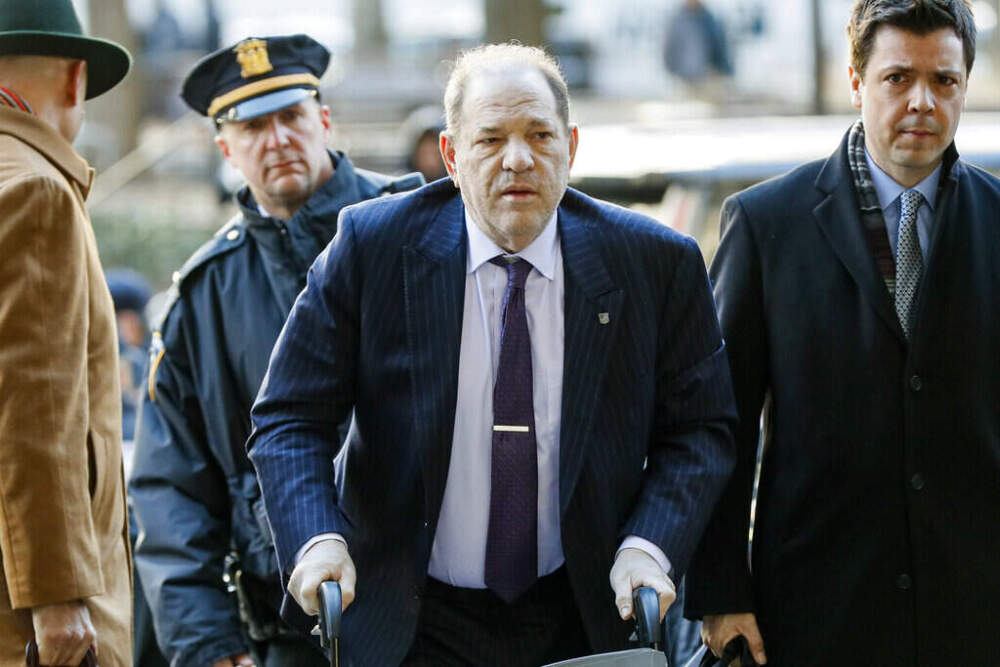Advertisement
Commentary
Fragility was baked into Harvey Weinstein's trial

As the sexual predator whose downfall ushered in the #MeToo movement, Harvey Weinstein is permanently associated with serial sexual violence and the use of non-disclosure agreements (NDAs) to silence victims. He personifies the tactics powerful men use to bully victims while eluding accountability and was convicted of rape in two separate trials: one in New York in 2020 and another in Los Angeles in 2023. He is currently serving a 23-year sentence for the former conviction, after which he will serve a 16-year sentence for the latter. His legal fate was settled — or so we thought.
On Thursday, the State of New York Cout of Appeals overturned his conviction by a 4-3 vote. The majority objected that the prosecution included witnesses who testified that Weinstein sexually assaulted them, although Weinstein was not charged with those particular crimes.
Some legal experts opine that the New York verdict was “fragile from the start.” But to understand how that fragility was baked into the trial, we have to remember the obstacles survivors confronted in holding Weinstein accountable at all.
The criminal-legal system was indifferent when it wasn’t downright hostile to Weinstein’s victims. Weinstein’s abuse was so well known that many journalists covering Hollywood had already fact-checked multiple allegations against him, but many of those stories remain unpublished. Some publishers preferred to maintain access to powerful men rather than print stories about their abuse. Others used a “catch and kill” technique (which is also at issue in Trump’s electoral interference and hush money trial). Weinstein’s threats of retaliation and boasts of impunity were very real, as Jodi Kantor and Megan Twohey documented when they broke the Weinstein story in 2017 and kicked off a wave of survivor speech. He seemed beyond the reach of the law because — for decades — he was.
The overturning of Weinstein’s New York conviction reminds us of how hard it was to bring the case against him in the first place. After all, the police had heard allegations about Weinstein before. For example, the NYPD found Ambra Battilana Gutierrez sufficiently credible when she reported that Weinstein lured her to his hotel on the pretext of a meeting, only to grope her and attempt to force her into his hotel room. The NYPD persuaded her to wear a wire and meet with Weinstein again to gather more evidence. I have listened to this recording. Gutierrez is terrified and Weinstein is relentless. Despite a credible victim — and a tape recording of Weinstein admitting to the assault — the Manhattan district attorney refused to charge him.
But Gutierrez’s story is just one of many. When the prosecution in the New York case called four women to testify about Weinstein’s pattern of sexual behavior, they did so to bolster the criminal charges brought by Jessica Mann and Miriam Haley. They were called as Molineux witnesses or “prior bad act witnesses,” a practice allowable in New York since 1901. Their testimony was used to establish Weinstein’s pattern of sexual activity. The jury found them credible and convicted him.
If you find this overturning of a settled case head-spinning and appalling, listen to the three dissenting judges. Commenting on the majority’s track record, Judge Madeline Singas accuses them of their own pattern of bias: “This court has continued a disturbing trend of overturning juries’ guilty verdicts in cases involving sexual violence.”
Judge Singas notes that overturning the conviction drags victims back to the days before #MeToo. She accuses the majority of “whitewashing the facts to conform to a he-said/she-said narrative [and] ignoring evidence of defendant’s manipulation and premeditation, which clouded issues of intent.” On the matter of mooting the contribution of the prior bad act witnesses, she says the decision fails “to recognize that the jury was entitled to consider defendant’s previous assaults.”
The overturning of Weinstein’s New York conviction reminds us of how hard it was to bring the case against him in the first place.
The dissenting judges give no quarter to the argument that the prosecution hurt its case by calling bad prior act witnesses. New York law allows it and the four women who testified represented a fraction of all the victims who were unable to testify at trial. Some of these women had signed NDAs, while others were precluded from testifying by statutes of limitations or issues of jurisdiction, and many were simply unwilling to reenter a legal system frequently described as “retraumatizing.”
In a perfect world, due process is not just a rule or a norm, it is a reality. In practice — in court — it was extended only to Weinstein. His conviction was not overturned because he is innocent. It was overturned because it is still possible to care more about the due process protections of a powerful man than his victims. So where does this leave them?
Thursday's verdict is a stark reminder that #MeToo was an extrajudicial movement because it had to be. Millions of survivors shared #MeToo stories in the wake of the Weinstein story breaking. Very few of them had anything to do with Weinstein. Instead, they emerged from epidemic levels of sexual violence. Together, these stories raised awareness of the scale of the problem, amplifying the survivors’ collective credibility.
Still, too many survivors are denied justice in courts of law. In her statement regarding the overturning of Weinstein’s conviction, Ambra Battilana Gutierrez said, “This is an ongoing failure of the justice system — and the courts — to take survivors seriously and to protect our interests.” Even when they win, she recognizes, their victories are tenuous.
